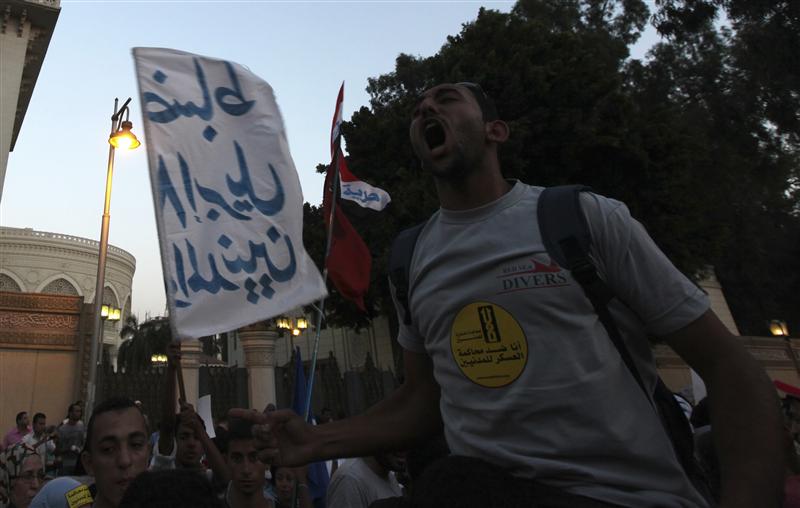Latest NEWS
- Aswat Masriya, the last word
- Roundup of Egypt's press headlines on March 15, 2017
- Roundup of Egypt's press headlines on March 14, 2017
- Former Egyptian President Hosni Mubarak to be released: lawyer
- Roundup of Egypt's press headlines on March 13, 2017
- Egypt's capital set to grow by half a million in 2017
- Egypt's wheat reserves to double with start of harvest -supply min
- Roundup of Egypt's press headlines on March 12, 2017
6 civilians referred to military prosecution for bombing Gharbiya gas pipeline

Activists chant against military trials for civilians by the presidential palace - Reuters
GHARBIYA, Dec 29 (Aswat Masriya) – The East Tanta Prosecution referred on Monday six civilians to the military prosecution for alleged complicity in the bombing of a natural gas pipeline in the governorate of Gharbiya.
The defendants were charged with joining an illegal organisation, in reference to the banned Muslim Brotherhood, and torching "production facilities".
Egypt's President Abdel Fattah al-Sisi issued on October 27 a new law which refers crimes committed against the state's public and "vital" facilities to the military judiciary.
The law, criticised by human rights organisations for expanding the jurisdicition of military tribunals on civilians, was passed shortly after the death of at least 33 security personnel in militant attacks in Sinai on October 24.
The legislation authorises armed forces personnel to cooperate with the police in securing "vital" facilities. It is valid for two years.
The law can be applied on cases which have not yet been referred to court, even if the events took place before the law’s issuance.
Earlier in December, the Egyptian prosecution referred 439 defendants to the military judiciary over violence which followed the deadly dispersal of two pro-Mohamed Mursi camps in August 2013.
The Minya prosecution referred on Sunday two civilians believed to be supporters of the Muslim Brotherhood to the military judiciary. They are accused of protesting without a permit and blocking a railroad during the anniversary of the dispersal of the pro-Mursi camps.
Also on Sunday, 15 students at the Zagazig University were referred to the military judiciary for "rioting", "terrorising citizens" and exercising violence.
Article 204 of Egypt's new constitution already allows referring civilians to military trials "in cases which represent a direct assault on armed forces institutions, their camps or anything that falls under their authority, alongside assaults on military or border zones, and military institutions, vehicles, weapons, ammunition, documents, secrets, public funds, or factories."
The article was strongly condemned by civil society organisations and a number of political movements before the constitution passed.
No Military Trials for Civilians, a group campaigning against referring civilians to military tribunals, has rallied protests against this article as well as previous legislations which allow the military trial of civilians.










